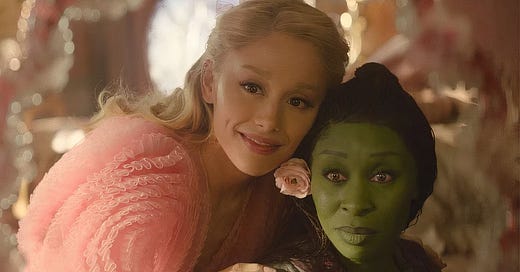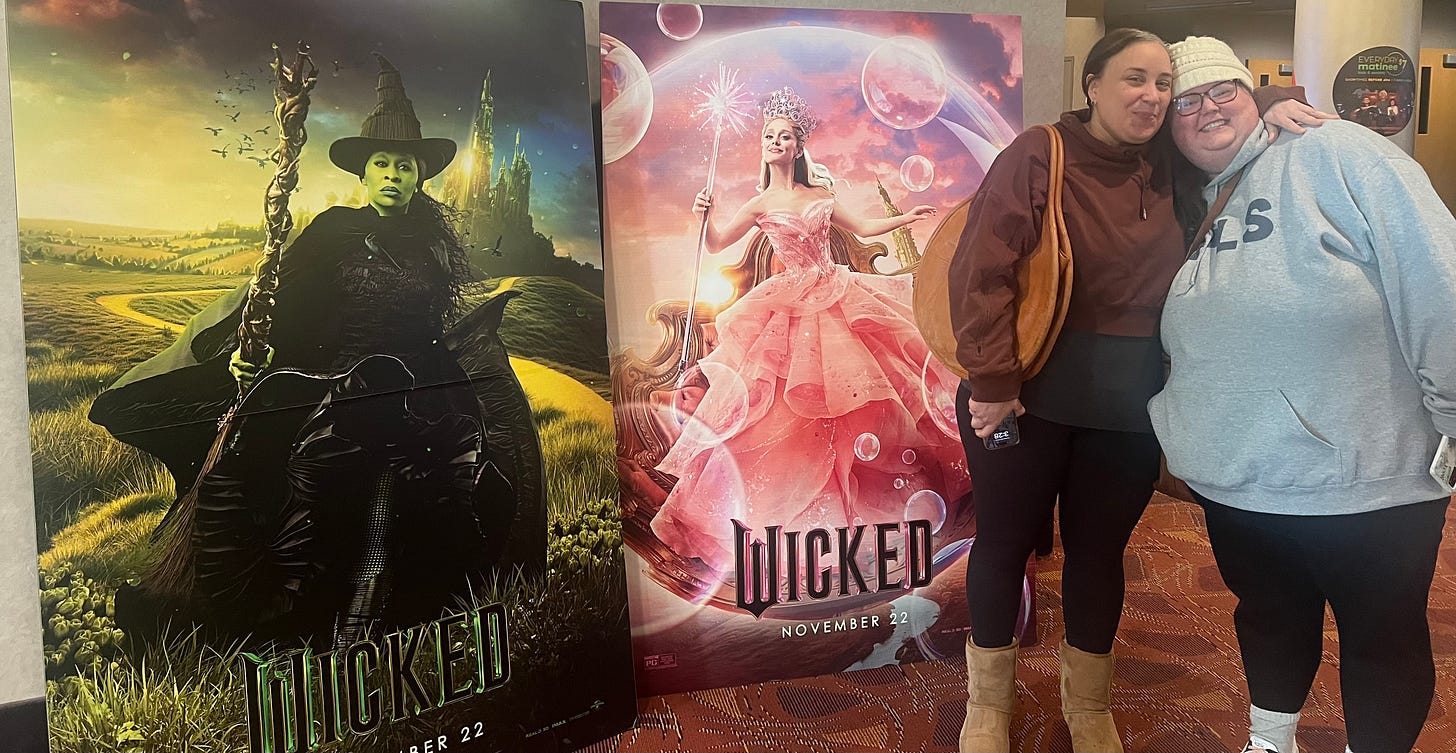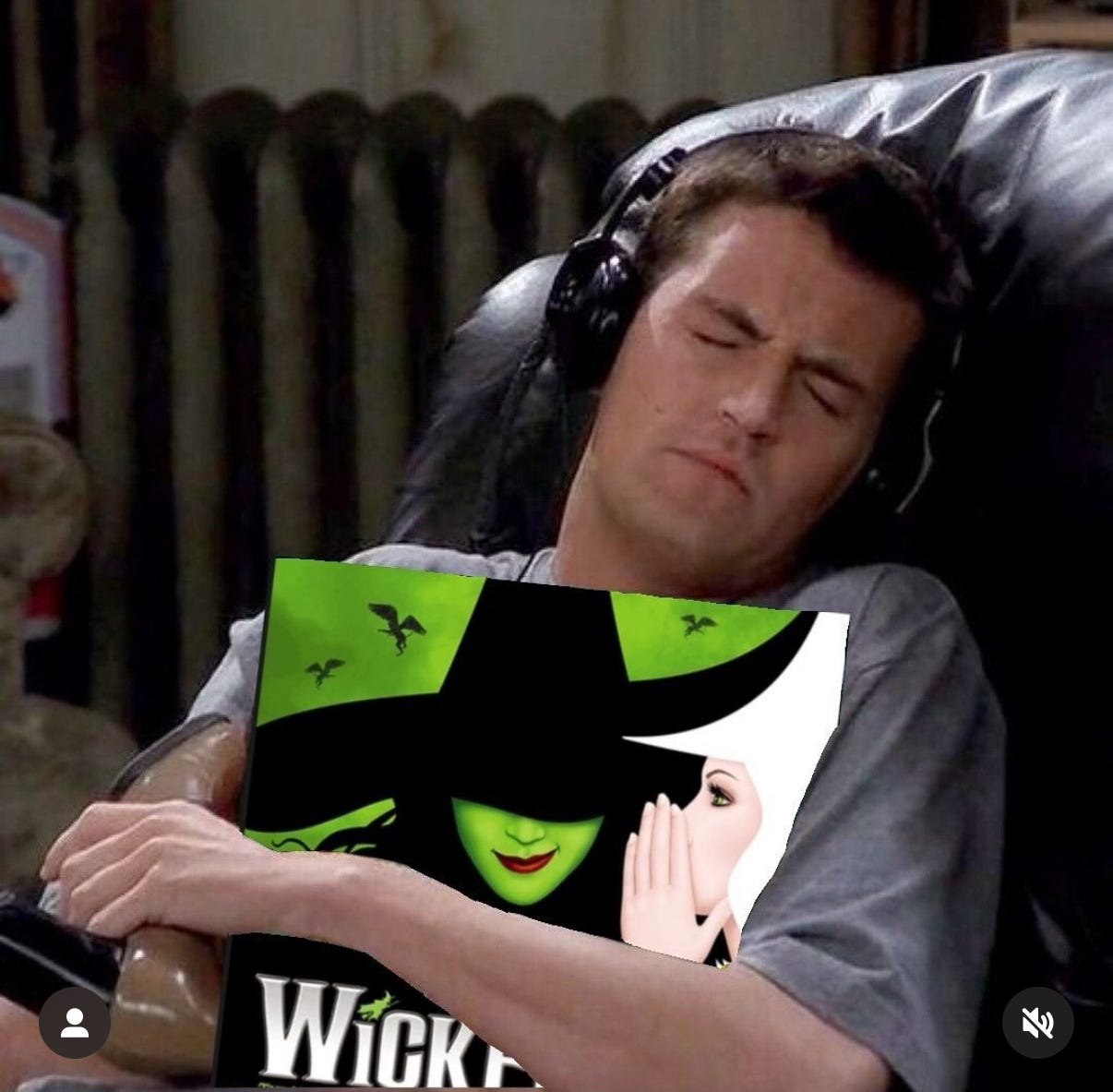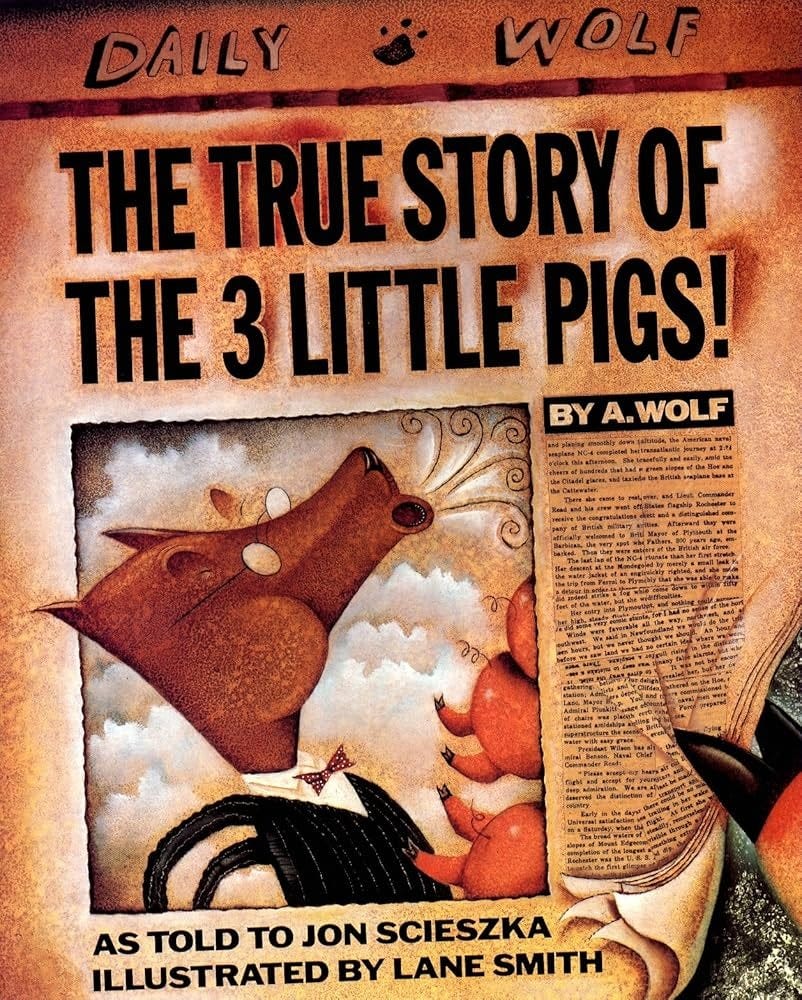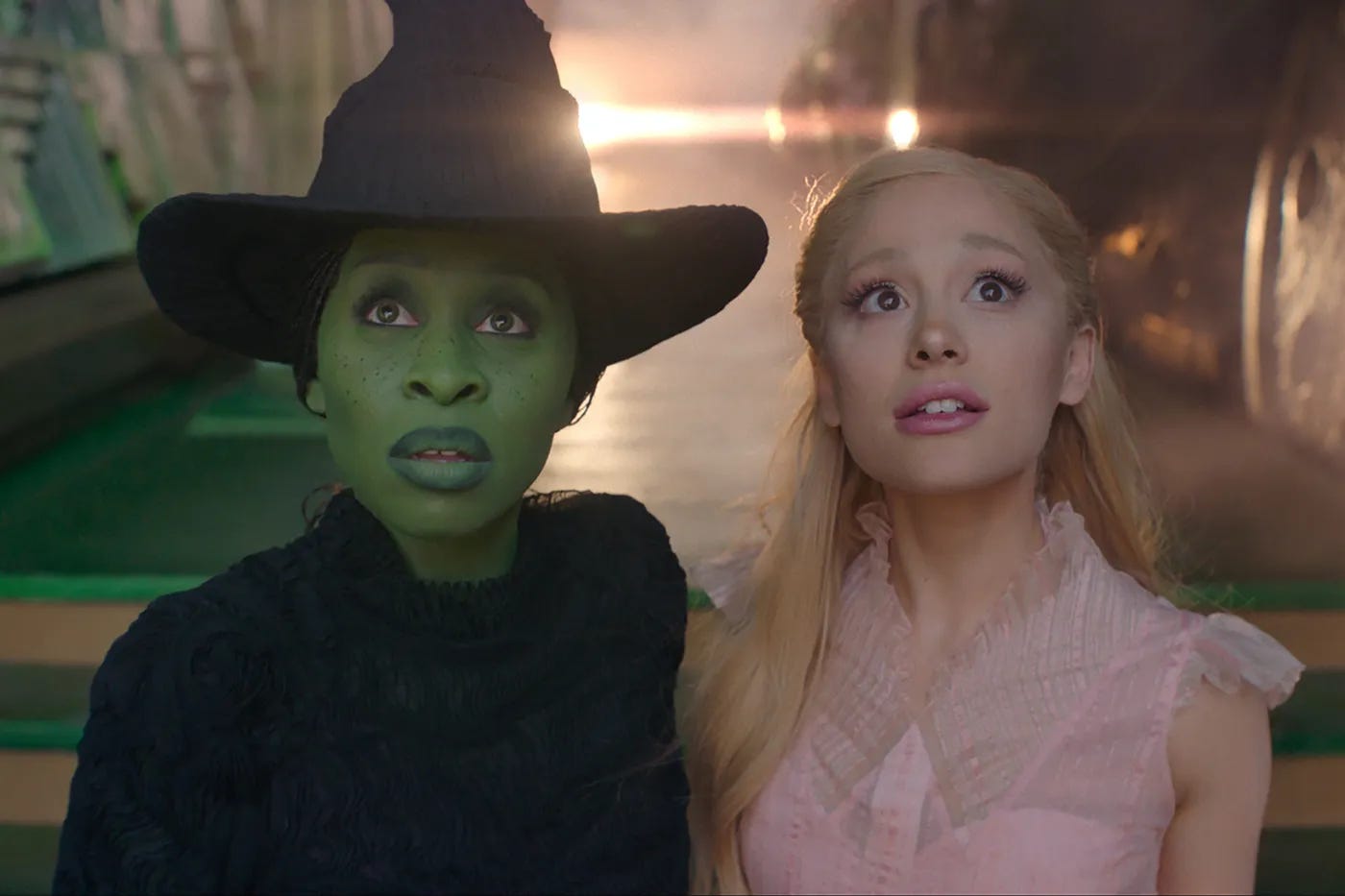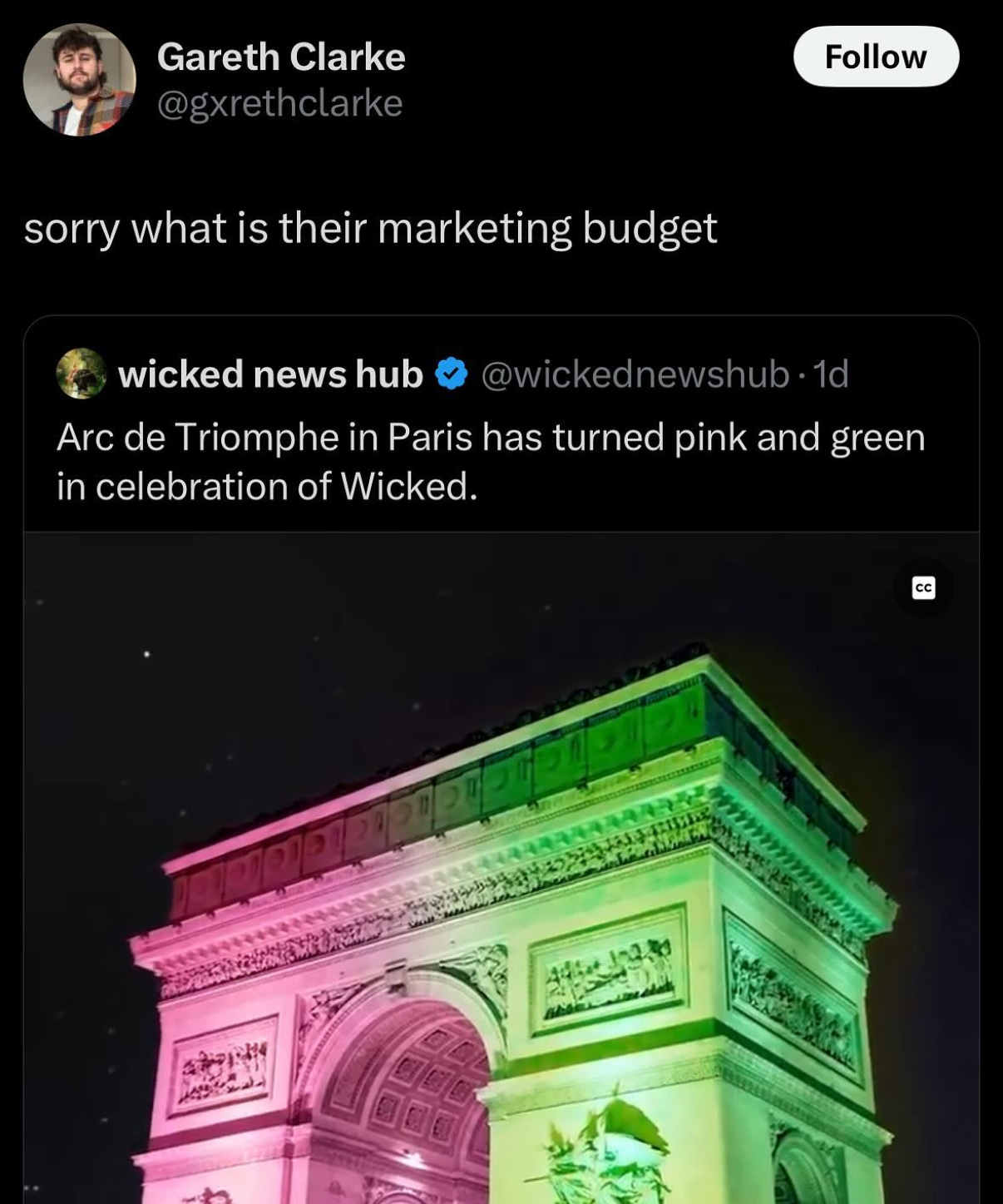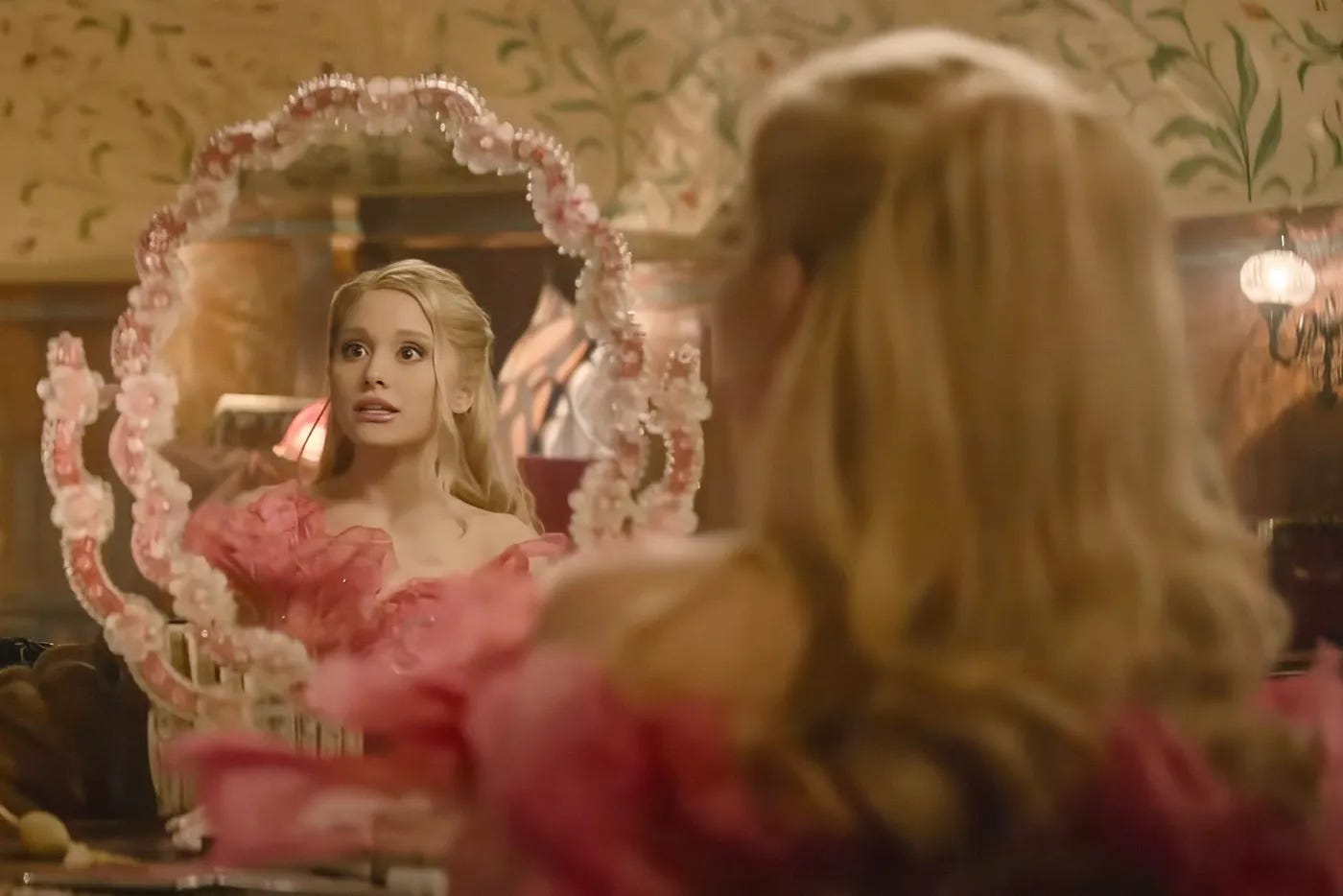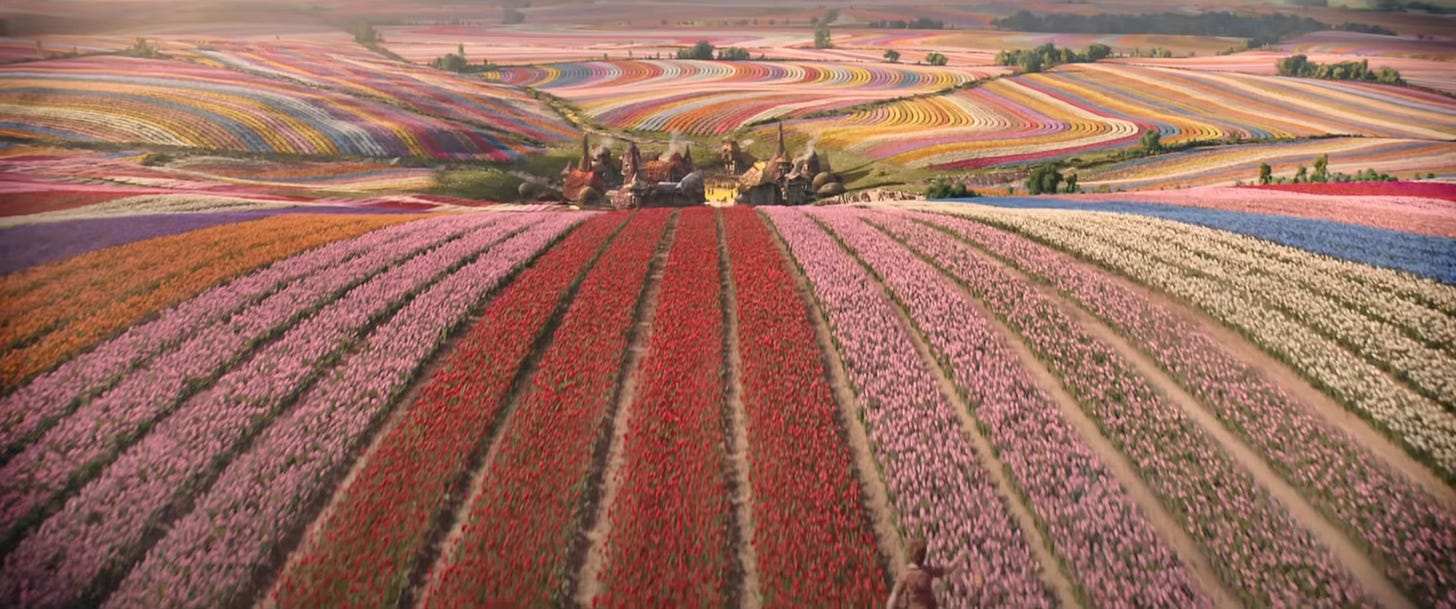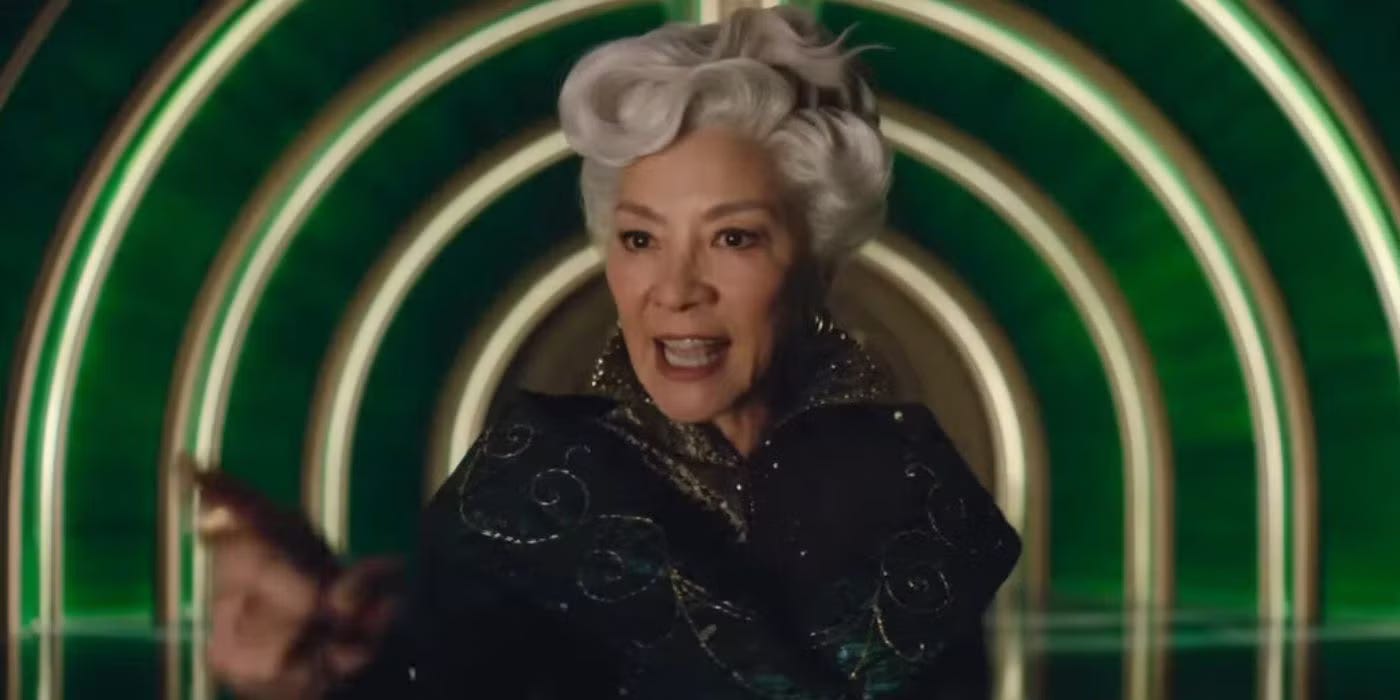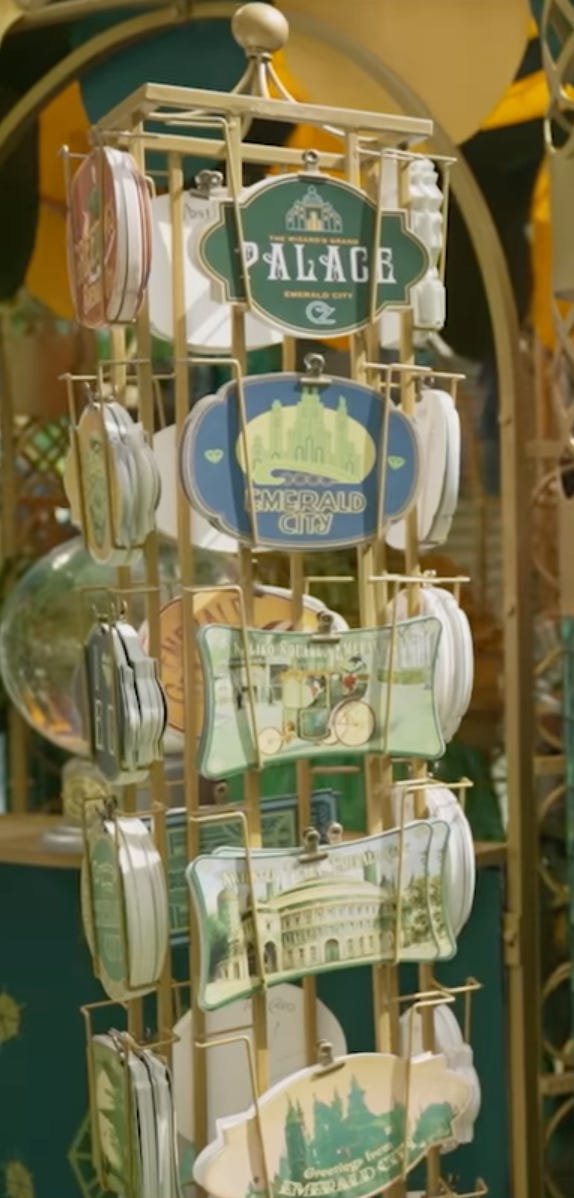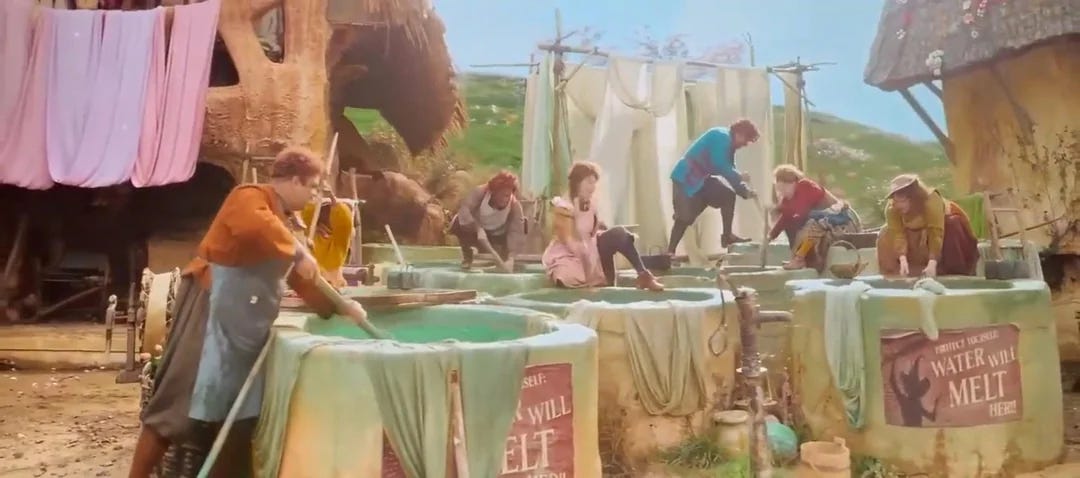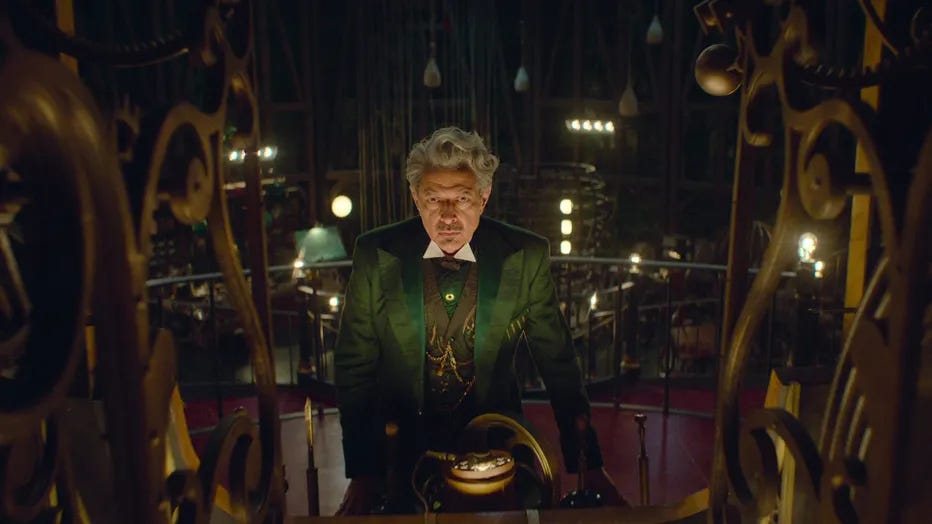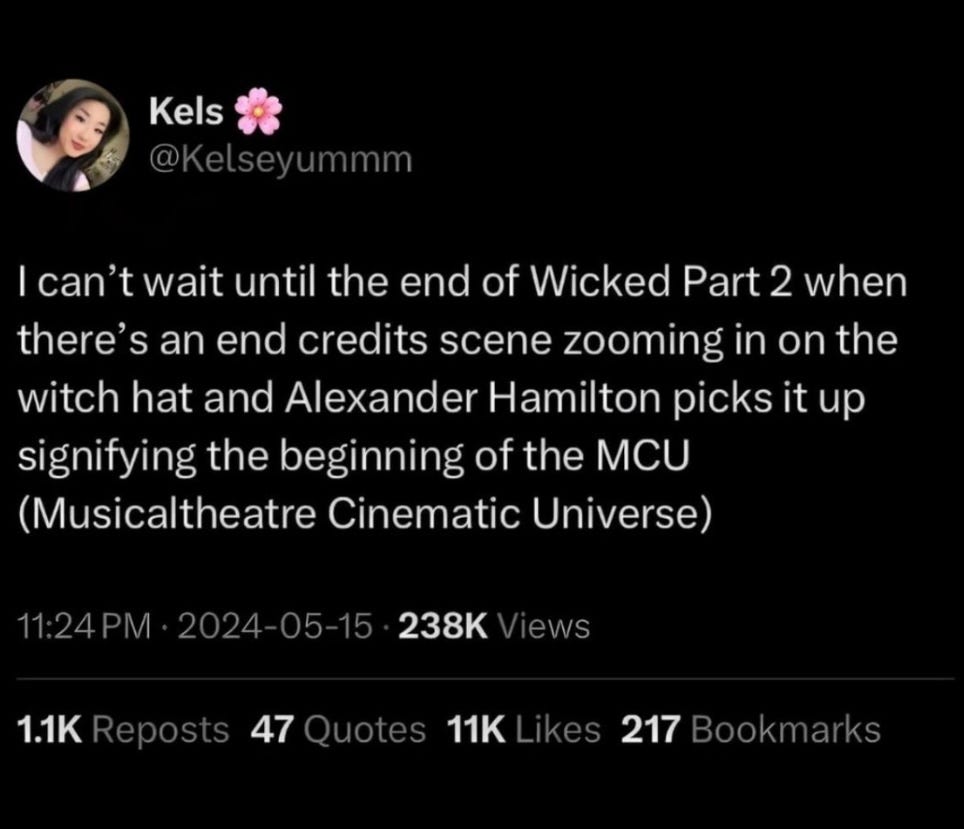Wicked is a masterclass in marketing
🪄 Wicked demonstrates the power of marketing (on multiple levels)
Last weekend, I had the pleasure and privilege of watching Jon Chu’s directorial masterpiece, Wicked. And it was just that: a fucking masterpiece. I got to sit between two of my best friends, choke down an ice-cold Dr. Pepper, and openly weep at the beauty, imagination, heart, and music of this sensory feast. From the set design to the musical talent, it was 10/10. Not a single crumb was left.
I was surprised by *how* much I enjoyed the film, since I’ve been a Wickedstan since 2005 and have been hungrily awaiting this film adaptation for actual years. Talk about build-up. How could ANYTHING live up to expectations like that? But it delivered.
But Wicked isn’t just a pleasant sensory experience or a joyful adaptation; it’s a masterclass in marketing—both within its story and in the way the film itself was marketed.
As a musical theater nerd, cinephile, and marketer, this realization hit me like a flying house.
If you haven’t seen Wicked and are unfamiliar with the plot and themes (congratulations for staying spoiler-free for 20+ years, I guess), it’s basically a Wizard of Oz version of that children’s book The True Story of the Three Little Pigs (the 3 little pigs told from the Wolf’s POV).
Wicked is the story of how and why the Wicked Witch of the West came to be…think of it like The Wizard of Oz is the story the Oz Government/Media want you to know and Wicked is the “real” story. Also, there are some spoilers below, so if that’s important to you…maybe skip this post…but also, catch up...
The Wicked marketing machine has been working overtime this past month. Between the press tours, interviews, late-night appearances, the viral and meme-worthy moments…one can hardly escape the pop cultural phenomenon of Wicked.
If June-August was BRAT Summer, then surely we are in the middle of Wicked Winter. But beyond the legendary marketing of Wicked (resulting in $214 million in box office sales as of November 29), I’d argue that the whole show itself IS about marketing. In fact, I wrote an essay about this on Medium back in 2016, and even though that was almost 10 years ago (gagging) I still think a lot of the points hold up.
Marketing Lessons We Can Learn from Wicked:
*It’s not about aptitude, it’s the way you’re viewed.
One of the first marketing lessons we see in Wicked is how charisma and charm outweigh competence, talent, and morality when it comes to gaining power. I’d argue this is the primary theme of the story. What is power? How do people gain power? How do they keep it? Is there any correlation between power and talent? Glinda sings a whole song about this (Popular) which makes me think she should have dropped out of Shiz and went to PR school instead.
“Think of celebrated heads of state or especially great communicators: Did they have brains or knowledge? Don’t make me laugh! They were popular! It’s all about popular. It’s not about aptitude, it’s the way you’re viewed, so it’s very shrewd to be, very, very popular, like me.”
- Glinda singing Popular
*Optics matter more than the truth.
The opening sequence to Wicked is called No One Mourns the Wicked and it’s a whole song featuring the people of Oz celebrating Elphaba’s death (after Dorothy melts her).
The song features a bunch of Munchkinland residents and kids tut-tuting Elphaba and preaching that “the wicked’s lives are lonely….the wicked die alone.” But as Glinda begins recalling her true relationship with Elphaba (and we’re thrown into a flashback that lasts the whole movie), we see firsthand that Elphaba isn’t wicked. She’s FURIOUS. And she has every fucking right to be.
Throughout the story, Elphaba is berated, neglected, underestimated, cast aside, and has spent her whole life being told she is less than by grown men with ridiculous egos who can’t do shit. Also, a house lands on her sister Nessa and kills her. You better believe if someone killed my sister, I’d be out for blood. But that’s the thing. No one knows any of this, because it kind of doesn’t matter. Once Elphaba is labeled “wicked,” it’s impossible for her to explain herself or communicate the truth. Because the truth doesn’t matter (depressing).
*Whoever tells the best story first + loudest, wins.
Wicked Part 1 ends with Madame Morrible telling all of Oz that Elphaba is a wicked traitor and a threat to their safety. She gets on the Wizard’s giant intercom and tells everyone that Elphaba’s the reason for the flying monkeys. She’s dangerous.
In an attempt to cover-up some light government conspiracies, the media in Oz has a direct influence over politics, people, and how events are positioned. And once the media finds a good story that grips its audience, gives people a scapegoat/being to blame, and boosts its ratings, it’ll never let go. Just ask Monica Lewinsky.
The parallels between Madame Morrible's smear campaign against Elphaba and modern political media machines are striking. Whether it’s in Oz or the real world, controlling the narrative often matters more than the truth.
*Print isn’t dead.
Blink and you’ll miss them, but in the musical number One Short Day, when Elphaba and Glinda frolic through the Emerald City, you can spot some beautiful printed postcards…part of the Oz marketing propaganda machine. Remember, everyone loves a well-designed leave-behind.
There are also a few posters strewn about Munchkinland, warning everyone of the Wicked Witch. Print materials can be powerful!
*Never underestimate the power of a catchy name.
Sorry Elfie, but “The Wicked Witch” just sticks. This is the same principle that elementary school kids understand innately when doling out hurtful nicknames. “Glinda the Good.” “The Wonderful Wizard of Oz.” It’s hard to tell who is really good or bad when these alliterative nicknames just work so well.
While we’re talking about the Wizard it’s also worth noting that this man is a SHOWMAN. The lore of him entering Oz in his hot air balloon is what folktales and fantasies are made of. And the scene in the movie of him, Elphaba and Glinda all brainstorming which color his new “road” around Oz should be shows that this man is truly a marketing genius.
*A makeover is sometimes enough to revitalize a struggling brand; other times it’s too late.
Elphaba’s makeover came a little too late (and also, unintentionally made her look MORE evil?). While Glinda worked as hard as she could to try and change Elphaba’s image at Shiz, it was too little too late. It’s the same thing for big (and older) brands.
When their brand identities start to feel outdated, it’s easy to just want to give them a head-to-toe makeover: Let’s change our product! Our price! Our name! Our distribution strategy!
Companies will try anything to save a dying brand. They’ll throw millions at a marketing blitz with new branding, ads, gimmicks, designs. But guess what? If they don’t change WHO they are or how they operate, then it doesn’t matter. You can’t change who you are.
So instead of trying to make Elphaba popular by her own measurements and standards, Glinda should have been trying to make Elphaba popular by empowering her to be her strong, smart, passionate self. Nice try though, Glinda.
Wicked has already proven itself to be more than a movie. It’s a reminder of the power of storytelling—both in art and in marketing. Whether in Oz or in our own world, the way we spin our stories shape how they’re remembered.
Now, when does Part 2 come out again??????

